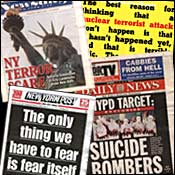
One morning on Sixth Avenue. That rental truck with the I LOVE ALLAH bumper sticker. This is the kind of touch, one imagines, that abloodthirsty Al Qaeda foot soldier might find piquant. Well, then, if thatis a truck bomb, what should be expected? In the mind’s eye, a hail ofshrapnel bursts through the side of the truck in stately slow motion,scattering pedestrians and newsstands and baby carriages. Would you see themetal as it hurtled toward you? Might the bulletproof glass in the cab beany protection?
And on and on – what questions are more interesting than these? – until yourealize that, actually, you’re holding a copy of the New York Post, openedto the sports page (one fantasy world substituted for another), reading tosee what the Boston fans have to say about Jason Kidd now.
One thing September 11 did was to extend the horizon of believability. Thateffect was accentuated recently when the Bush administration chose to floodthe market with junk warnings. The Brooklyn Bridge? There’s a bull’s-eye onit. Nuclear? Not if but when. (No doubt, they’re not making these up – but italso seems somewhat implausible that they’re telling us this for ourprotection.)
It’s become impossible to discuss life in the city now without invokingscenarios heretofore contemplated only in Bruce Willis movies. The New YorkTimes Magazine with a shouting cover about nuclear terror, the essentialpoint of which was, what if some aggrieved mad scientists got hold of agoodly chunk of enriched uranium? Well, then they could download plans fromthe Internet . . .
If we believe the scenario proposed in this article, which is our customaryposture toward information contained in the New York Times, then we don’thang around here too long, right? We’d want to make plans to move to Maine,Vermont, anywhere but here. This would be the sensible thing. Staying in thecity and suffering the consequences might be an avoidable catastrophe, liketripping in high heels, the price we pay, as New Yorkers, for being tooattached to our glamorous (yeah, right) lives.
But really, how can we even talk about this?
So here we are. Most of us are staying. The apartments of those who areleaving are eagerly snapped up. “The only thing we have to fear is fearitself,” trumpeted the Post, quoting a man one wouldn’t think would be oneof their patron saints. A less rousing but more accurate formulation is, wecould learn to live with being afraid. We already have.
The horrible spectacle and novelty of 9/11 may have deceived us as to thenature of terrorism. It’s not war but street crime, or getting hit by a buswrit large. It erodes our rights (the happiest man in the country seems tobe John Ashcroft) and may continue to produce, on our side, new portraits ofgrief. But there’s liable to be less and less of the swelling sense ofnationhood that characterized last fall.
One day recently at the firehouse on Great Jones Street, which lost ten menon September 11, they were filming a movie. There were arrays of votivecandles, roses straight from a florist’s refrigerator. Signs lettered inMagic Marker, as close as possible to the originals: OUR HEROES; 9/11: WE’LL NEVER FORGET.
It will, of course, be impossible to forget. The city’s culture industry hasalready set upon September 11, devouring it, reconstituting it. Producingendless, artificial milestones, ceremonies, opportunities for reflection. Adelta of emotional rivulets, so many that our minds don’t fix on any one ofthem (those light towers were weirdly disappointing for this reason). Thisis how it slips away.
There’s an unavoidable nostalgia for the fullness of that tragic feeling,when it began to sink in that the world had changed. But we can’t go backthere – even if we wanted to.